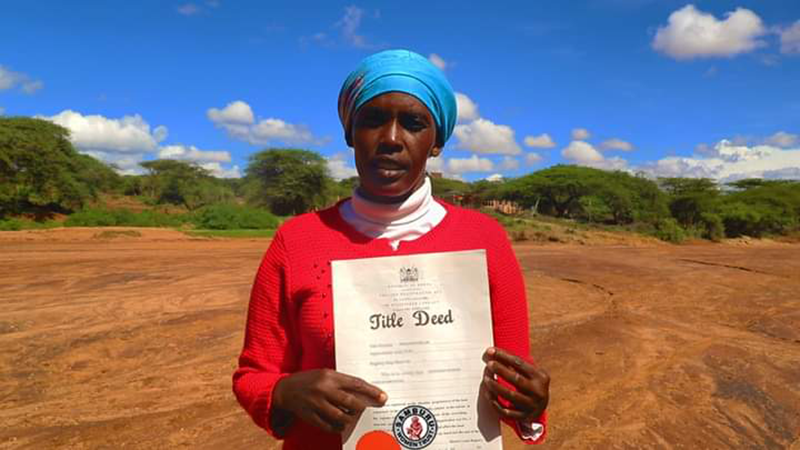
Historically, women have been faced with significant barriers to accessing and owning land, as well as holding leadership positions in relation to land and natural resources. Indigenous women often face intersecting forms of discrimination and marginalization regarding land rights. Despite the challenges, indigenous women have stood up for their rights and continue to advocate for equal access to land and participation. Women perspectives and experiences bring unique insights to the table and contribute to more comprehensive and effective solutions towards achieving gender equality.
There has been a gradual increase in the percentage of women who own and manage land in Kenya over the recent years. According to a report by the Kenya Land Alliance, women currently own about 5-6% of registered land in Kenya, which is an improvement from the 1% estimated in the 2010 constitution.
Janet Lenamalda from Wamba, Samburu East, a Treasurer of Sarara Community Land Management Committee (CLMC) has faced numerous challenges including discrimination in land leadership. She is a perfect example that shows the struggles of indigenous women seeking to have their voice in patriarchal societies. Janet has been fighting for far too long the patriarchal culture which suppresses women rights in the ownership of land. Even before the revolutionary of the Community Land Act 2016, Janet had struggled and broken all odds to seek leadership in Sarara Community Group Ranch and served there for two consecutive terms.
“Women are not allowed to vie for seats since they belong to men only. Despite that, I held my head high and went for the position contested by men. I defeated four male contestants and that’s how I became the treasurer of Sarara Community Land Management Committee. I urge my fellow indigenous women to stand on their ground and go for these leadership positions since leadership is not something you are given, it’s something that you take.” Said Janet.
Upon the onset of the Community Land Act 2016, women are now included in the land committees with women occupying a third of the total number of fifteen CLMC members.
The registration of community land in Isiolo has been slow, and the locals’ uneasiness is rising as a result. The requirements have all been met by the communities, who have done their part. SWT has provided the community with training and information regarding the Community Land Act 2016 and its requirements. In an effort to have their respective land registered under community, the community welcomed the law and moved quickly to comply with its standards. Women, single mothers and people with disabilities (PWDs) must be included in the community land register and the CLMCs among other obligations. So far, the efforts are bearing fruits with the inclusion of women and young people in community land committees.
The residents of Oldonyiro were issued with title deeds, 800 women secured their land out of the 1500 total title deeds that were issued.
Joyce Lesoito, a single mother from Oldonyiro received her title deeds. “With regard to property ownership, I already knew my rights as a woman, so when the adjudication process was complete, I was able to visit the Isiolo land registrar and pick up my title deeds,” she said with a smile on her face.
However, while progress is made, there is still much work to be done to ensure that there is gender equality in land ownership and governance and the rights of indigenous women in land are upheld and communities get to secure their land fully.






